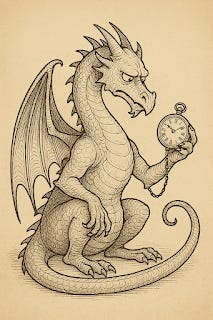Now ... I don't want people to think that this is a disparaging article. As we in the TTRPG community are wont to say, there is no right or wrong way to play. Those who know me are aware that I am disappointed with the direction that D&D has taken over the last few years. However, let's be clear on the fact that we all want the hobby to expand so that more and more people can enjoy what has brought so much excitement and meaning to the lives of us dear, old grognards. So, in the end, it's all good.
Therefore it is with my tongue placed firmly in my cheek that I propose the following sustained analogy:
5e players are like toddlers and AD&D players are like pre-teens
I speak as someone who is both a parent (now) and an adventurer (1980s) who has noticed a few similarities of habit amongst these sub-cultures of humanity. Watching my son grow up I have been interested to observe the changes in play styles of children as they develop.
When he was very young, say under five years of age, playdates were very much instigated by the grown ups. Two or more children of a similar age would be thrust together and told to "play" and "make friends" ... much like a modern D&D group online or at a convention. The reason for said playdate was usually so that the adults could have a conversation about something other than dinosaurs for at least half an hour in their lives.
What you see when young children are placed in this scenario is that they don't so much play with each other, as near each other. There might be the occasional coming together (usually when one wants the toy another is currently holding) but, in general, they are very much focused on their own individual experience.
From what I have encountered of 5e, especially when you aren't playing in-person with real life friends and family, the play style of modern D&D enthusiasts is toddler-adjacent. The emphasis on character backstory, the resistance to character death, and the pages and pages of abilities, feats, traits and spellcasting leads to a self-centered approach. It's like a group of toddlers who are all doing the same activity, in the same space, at the same time ... yet disconnected.
Calm down ... don't get upset. Obviously this isn't the case for all 5e players. But I do believe, in general, it can be said that the current version of D&D sees the Ego leaning toward the Id and away from the Superego in its focus. The way the game is designed encourages participants to constantly think about the cool things their character can do, and what they will obtain when they next level up, rather than what the group is doing as a whole.
It's very popular. Make of that what you will.
Old school gaming, the pinnacle of which (for me) is Advanced Dungeons and Dragons (what people might call second edition), presents more of the play habits of children who, in real life, have leveled up. Kids who are of Primary School (Elementary School) age approach playing differently to toddlers.
For a start they seek out like-minded individuals and are not reliant on outside forces to smoosh them together. In D&D terms it's like reading Knock! magazine and joining an OSR Discord server, rather than jumping on Start Playing. It's playing with friends in the basement rather than walking into the local games store and seeing what's happening. Again ... there is no right or wrong and we want as many people to access the hobby as possible. This is not an attempt at gatekeeping, merely an observation.
More interestingly, when they play together, pre-teen children mirror the old school style of D&D. They create a unique imaginary shared world and are constantly negotiating to change the rules to suit themselves. So, yes, there is still a tendency to check in regularly with one's own wishes and desires, but there is more awareness of the bigger picture. They use the "yes .. and" approach as well as the "no ... because" platform.
It's the way in which they arrive at, what we would call in D&D terms, the house rules that shouts old school TTRPG the most. When we were teenagers with limited patience and limited access to the official rules of D&D we pretty much made up our own version to save all the page turning and semantics. These days OSR games are designed much more eloquently than the clunky AD&D which makes it easier to interpret the rules ... but each table should be collaborative and unique. Like the way pre-teens interact.
Well ... I hope I haven't gotten anyone's dander up too far. I could say that, following the extended metaphor to its conclusion, we are all waiting for 5e players to grow up ... but that would be denying them an important part of their TTRPG development. The take-away from all this should be that as TTRPG players, no matter how we play, we are all kids at heart ... and that's a big advantage we hold over those who never have (and possibly never will) play D&D.
Sucks to be them ...




Nice article. No offense. See it as observation. I have actually only played 3.5 as both player and DM.